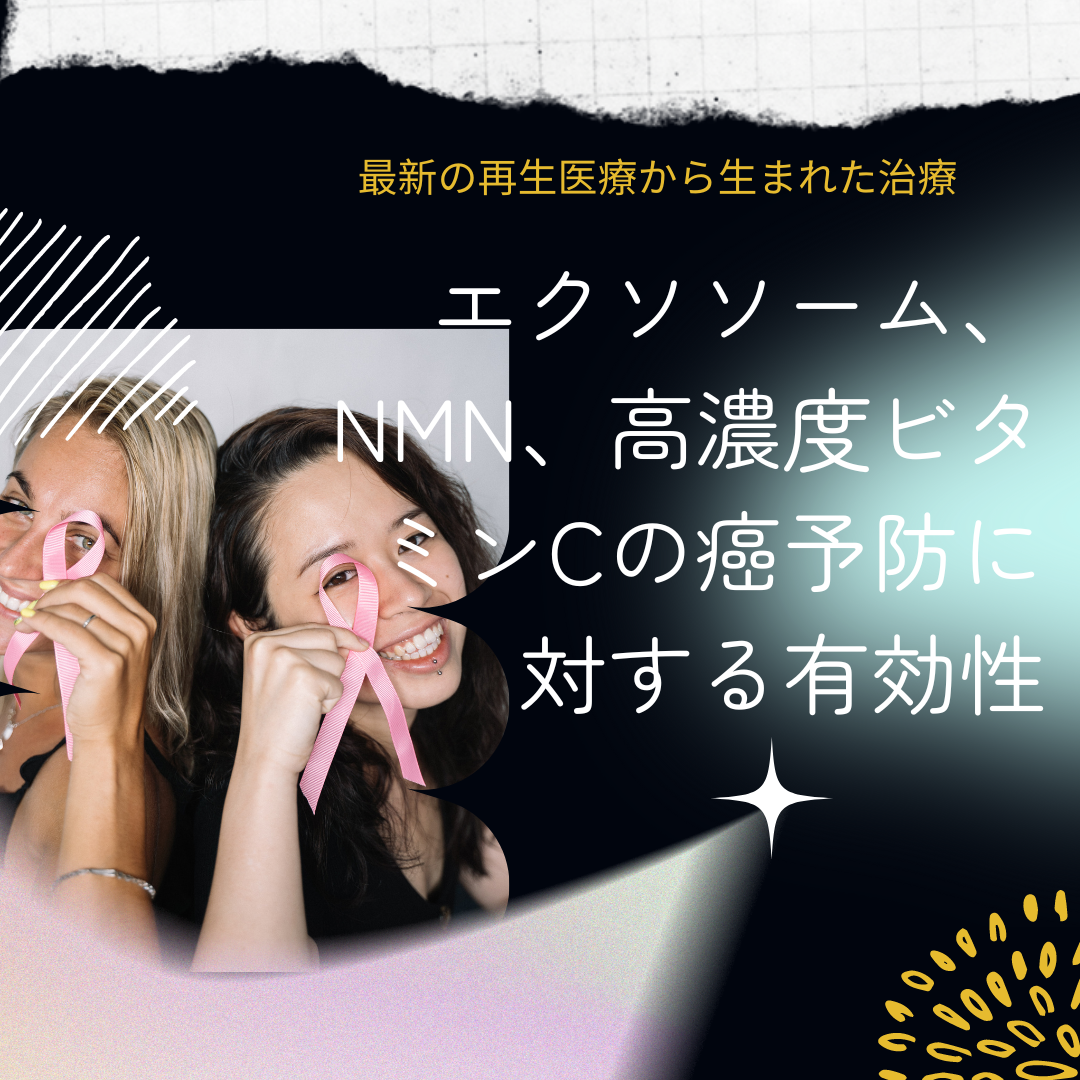NEWSお知らせ
2024.08.10|ブログ
エクソソーム、NMN、高濃度ビタミンCの癌予防に対する有効性について、名古屋の美容皮膚科医が解説

エクソソーム、NMN、高濃度ビタミンCの癌予防に対する有効性について、名古屋の美容皮膚科医が解説
こんにちは、Wスキンクリニック名古屋、院長の加藤晃司です。
今回は、エクソソーム、NMN、高濃度ビタミンCの癌予防に対する有効性について解説します。
誰もがそうですが、大病にならないようにすることは非常に重要です。
健康診断で早期発見も大事ですが、そもそも癌にならないように予防していくことも重要です。
HPVワクチン、HBVワクチンのようにワクチンで予防できる癌は予防して、その他は細胞を修復、再生させることで癌にならないようにしていきましょう。
エクソソーム、NMN(ニコチンアミド・モノヌクレオチド)、および高濃度ビタミンCは、再生医療や健康促進の分野で注目されていますが、これらが癌予防に有効かどうかについては現在も研究が進行中です。それぞれのメカニズムと現在の研究状況について以下にまとめます。
(1)エクソソーム
①特徴とメカニズム:
エクソソームは細胞から分泌される小さな膜小胞で、細胞間の情報伝達を担います。これにより、細胞の修復や再生が促進されます。
癌予防に関しては、エクソソームが免疫システムを調節し、炎症を抑える効果が期待されています。また、がん細胞との情報交換を阻害する可能性も考えられています。
②研究状況:
初期の研究では、エクソソームが腫瘍の成長を抑制する可能性が示唆されています。しかし、エクソソームの特性によっては、逆にがんの進行を助長するリスクもあるため、詳細なメカニズムと安全性についてのさらなる研究が必要です。
(2)NMN(ニコチンアミド・モノヌクレオチド)
①特徴とメカニズム:
NMNはNAD+の前駆体で、NAD+は細胞のエネルギー代謝やDNA修復に重要な役割を果たします。
NAD+はサーチュインと呼ばれる長寿遺伝子を活性化し、細胞の老化防止や炎症の抑制に寄与します。
②研究状況:
動物実験では、NMNがNAD+レベルを増加させ、DNA修復能力を高めることで、がんの発生リスクを低減する可能性が示されています。しかし、ヒトに対する効果についてはまだ限られたデータしかなく、長期的な安全性と有効性を確認するための臨床試験が必要です。
(3)高濃度ビタミンC
①特徴とメカニズム:
ビタミンCは強力な抗酸化作用を持ち、フリーラジカルによる細胞損傷を防ぎます。これにより、がんの発生リスクを低減する効果が期待されています。
高濃度ビタミンCは、免疫機能の強化や炎症の抑制、さらにはがん細胞の増殖を直接抑える効果も報告されています。
②研究状況:
一部の研究では、高濃度ビタミンCの静脈注射が特定のがんの治療や予防に有効である可能性が示されています。しかし、これらの効果を確認するためにはさらなる大規模な臨床試験が必要です。また、ビタミンCの高濃度投与は、適切な医療監督の下で行う必要があります。
まとめ
今回はエクソソーム、NMN、高濃度ビタミンCの癌予防に対する有効性について解説しました。
エクソソーム、NMN、高濃度ビタミンC治療はそれぞれ機序が異なるため、併用すればより効果はたかまるでしょう。
私はこの3つの点滴を毎週行うようにしています。
アンチエイジングは少しでも早くスタートしましょう。
Wスキンクリニック名古屋でのエクソソーム治療はこちら
https://www.w-clinic-nagoya.com/acne/exosome
NMN点滴はこちら
https://www.w-clinic-nagoya.com/beauty-drip/nmn
高濃度ビタミンC点滴はこちら
https://www.w-clinic-nagoya.com/beauty-drip/vitamin-c
*当院では
NMNは一般社団法人NMN医療研究会、エクソソームはセルソース株式会社のM2P-エクソソームを使用しています。
Wスキンクリニック名古屋
理事長 加藤晃司
当院では無料でスタッフカウンセリングを行なっております。
お気軽にご予約くださいませ
Wスキンクリニック名古屋 (美容皮膚科)
https://www.w-clinic-nagoya.com/
〒461-0005 愛知県名古屋市東区東桜 2-4-1 第3コジマビル6F
TEL 052-7377-7117(10:00~19:00)
LINE ID @w.nagoya
高岳駅より徒歩4分 / 新栄町駅より徒歩5分
お車でお越しの方
名鉄協商パーキングチケットをお渡しいたしますので、クリニック近くのパーキングをご利用ください。
The Potential of Exosomes, NMN, and High-Dose Vitamin C in Cancer Prevention: Explained by a Dermatologist in Nagoya
Hello, I’m Dr. Koji Kato, Director of W Skin Clinic in Nagoya.
In this discussion, I will explain the potential efficacy of exosomes, NMN (Nicotinamide Mononucleotide), and high-dose vitamin C in cancer prevention. Prevention is crucial in avoiding serious diseases like cancer, and while early detection through health check-ups is vital, proactive prevention is equally important.
- Exosomes
Characteristics and Mechanism:
Exosomes are tiny vesicles released from cells that facilitate intercellular communication, promoting cell repair and regeneration.
In cancer prevention, exosomes are thought to modulate the immune system and suppress inflammation, potentially interfering with cancer cell communication and proliferation.
Current Research:
Early research suggests that exosomes might inhibit tumor growth. However, depending on their characteristics, exosomes could also carry the risk of promoting cancer progression. Therefore, more research is needed to understand the mechanisms and ensure safety.
- NMN (Nicotinamide Mononucleotide)
Characteristics and Mechanism:
NMN is a precursor to NAD+, a molecule crucial for cellular energy metabolism and DNA repair.
NAD+ activates sirtuins, often referred to as longevity genes, which help prevent cellular aging and reduce inflammation, potentially lowering cancer risk.
Current Research:
Animal studies have shown that NMN increases NAD+ levels, enhancing DNA repair and potentially reducing cancer risk. However, data on its effects in humans are still limited, and more clinical trials are needed to confirm its long-term safety and efficacy.
- High-Dose Vitamin C
Characteristics and Mechanism:
Vitamin C is a potent antioxidant that protects cells from damage caused by free radicals, thereby potentially reducing cancer risk.
High-dose vitamin C has been reported to strengthen immune function, suppress inflammation, and directly inhibit cancer cell growth.
Current Research:
Some studies indicate that intravenous high-dose vitamin C may be effective in treating or preventing certain types of cancer. However, large-scale clinical trials are necessary to validate these findings, and such treatments should be administered under medical supervision.
Conclusion
In summary, while exosomes, NMN, and high-dose vitamin C each have unique mechanisms of action that could contribute to cancer prevention, combining these treatments may enhance their efficacy. I personally undergo these three therapies weekly as part of my anti-aging regimen, and I recommend starting such preventive measures as early as possible.
Preventive care is a proactive step toward maintaining health and potentially avoiding serious diseases like cancer.




